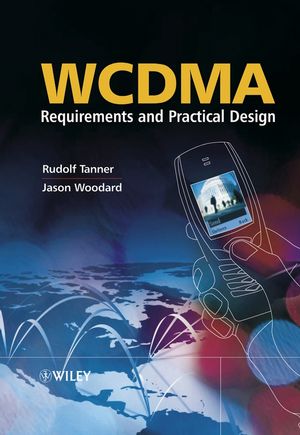WCDMA: Requirements and Practical DesignISBN: 978-0-470-86177-6
Hardcover
452 pages
March 2004
 This is a Print-on-Demand title. It will be printed specifically to fill your order. Please allow an additional 10-15 days delivery time. The book is not returnable.
|
||||||
Acknowledgements xix
Abbreviations xxi
1 Introduction 1
1.1 Evolution and Revolution of Mobile Telephony 1
1.2 The Third Generation Partnership Project 9
1.3 3GPP Terminology 13
1.4 The Journey of a Bit 14
1.5 Structure of the Book 18
2 RF and Baseband Processing 19
2.1 Introduction 19
2.2 UMTS Radio Requirements 20
2.3 Receiver RF Design 25
2.4 Receiver Baseband Design 36
2.5 Transmitter Baseband Design 48
2.6 Transmitter RF Design 52
2.7 Future Trends 64
3 Physical Layer Chip Rate Processing 67
3.1 Introduction 67
3.2 Spreading and Scrambling 70
3.3 Physical Channels 75
3.4 The Receiver 84
3.5 Cell Search 95
3.6 Power Control 98
3.7 Handover 101
3.8 Transmit Diversity in the Downlink 104
3.9 Physical Layer Procedures 107
3.10 Measurements 109
3.11 Compressed Mode 112
4 Physical Layer Bit Rate Processing 123
4.1 Introduction 123
4.2 Transport Channels, Formats and Combinations 124
4.3 Overview of the Bit Rate Processing Chain 129
4.4 Rate Matching 142
4.5 Convolutional Encoding and Decoding 153
4.6 Turbo Encoding and Decoding 167
4.7 TFC Detection 188
4.8 Compressed Mode and the BRP 192
4.9 BRP Limitations for Different TrCHs and CCTrCHs 196
4.10 Conclusions 197
5 Type Approval Testing: A Case Study 199
5.1 Introduction 199
5.2 History: the Making of the 3GPP DPCH BLER Requirements 202
5.3 Lab Testing 202
5.4 Exemplary Measurement Results 218
6 Medium Access Control 221
6.1 Introduction 221
6.2 MAC Functional Partitioning 226
6.3 MAC Receive Functionality 230
6.4 MAC Transmit Functionality 234
7 Radio Link Control 239
7.1 Introduction 239
7.2 Transparent Data Transfer Service 243
7.3 Unacknowledged Data Transfer Service 245
7.4 Acknowledged Data Transfer Service 250
8 PDCP 261
8.1 Introduction 261
8.2 Overall Architecture 263
8.3 PDCP Interface 264
8.4 Header Compression 268
8.5 SRNS Relocation 271
8.6 PDCP Header Formats 273
8.7 Handling an Invalid PDU Type and PID 276
9 Broadcast/Multicast Control 277
9.1 Introduction 277
9.2 CTCH Scheduling 279
10 RRC 285
10.1 Introduction 285
10.2 Cell Selection and Reselection 292
10.3 Reception of Broadcast System Information 294
10.4 Paging and Notification 298
10.5 Establishment, Maintenance and Release of an RRC Connection Between the UE and UTRAN 299
10.6 Establishment, Reconfiguration and Release of Radio Access Bearers 300
10.7 Assignment, Reconfiguration and Release of Radio Resources for the RRC Connection 301
10.8 RRC Connection Mobility Functions 302
10.9 Routeing of Higher Layer PDUs 303
10.10 Control of Requested QoS 304
10.11 UE Measurements 305
10.12 Power Control 319
10.13 Arbitration of Radio Resources on Uplink DCH 320
10.14 Integrity Protection 320
10.15 Ciphering Management 321
10.16 PDCP Control 322
10.17 CBS Control 323
11 Speech Coding for UMTS 327
11.1 Introduction – the Adaptive Multirate (AMR) Speech Codec 327
11.2 AMR Structure 328
11.3 Linear Prediction Analysis 330
11.4 LSF Quantization 330
11.5 Pitch Analysis 330
11.6 Fixed Codebook with Algebraic Structure 331
11.7 Post Processing 332
11.8 The AMR Codec’s bit Allocation 332
11.9 Speech Codec’s Error Sensitivity 334
11.10 Conclusions 334
12 Future Developments 335
12.1 Introduction 335
12.2 3GPP Release 5: HSDPA 336
12.3 Location-based Services 359
12.4 CPICH Interference Cancellation and Mitigation 365
12.5 Transmit Diversity for Multiple Antennas 369
12.6 Improved Baseband Algorithms and Technology Trends 372
A Appendix A: ML detection for uncoded QPSK 391
B Appendix B: SIR computation 395
References 399
Index 417



